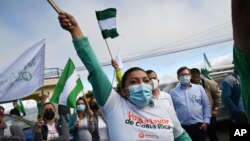A former president and a treasury minister from Costa Rica’s outgoing administration faced off Sunday to become the country’s next leader.
Jose Maria Figueres, who led Costa Rica from 1994 to 1998, represents the National Liberation Party like his father, three-time president Jose Figueres Ferrer. Rodrigo Chaves was the surprise of the first round of voting in February. He served briefly in the administration of outgoing president Carlos Alvarado and represents the Social Democratic Progress Party.
Both men waged a bruising campaign that highlighted past controversies. Neither approached the 40% of the vote necessary to avoid a runoff in the first round of voting. The latest polling had them in a technical tie heading into Sunday’s vote.
More than 3.5 million Costa Ricans were eligible to vote, but with many voters underwhelmed by the options, turnout could be even lower than the 60% in February.
Lines formed before voting started at some polling places in San Jose, the capital, while others appeared nearly empty.
Juan Morales, a 68-year-old retiree, voted early to avoid any crowds.
“I hope that everyone comes out to vote today,” he said. “I know that they don’t like the candidates much, but we have to elect a president and voting is to take care of democracy.”
Chaves' campaign is under investigation by electoral authorities for allegedly running an illegal parallel financing structure. He has been dogged by a sexual harassment scandal that drove him out of the World Bank.
Figueres has been questioned over a $900,000 consulting fee he received after his presidency from the telecommunication company Alcatel while it competed for a contract with the national electricity company. He was never charged with any crime and denied any wrongdoing.
While Costa Rica has enjoyed relative democratic stability compared with other countries in the region, the public has grown frustrated with public corruption scandals and high unemployment.
In the February vote, Alvarado’s party was practically erased from the political landscape, receiving no seats in the new congress. At the time of that first vote, the country was riding a new wave of COVID-19 infections, but infections and hospitalizations have fallen considerably since.




